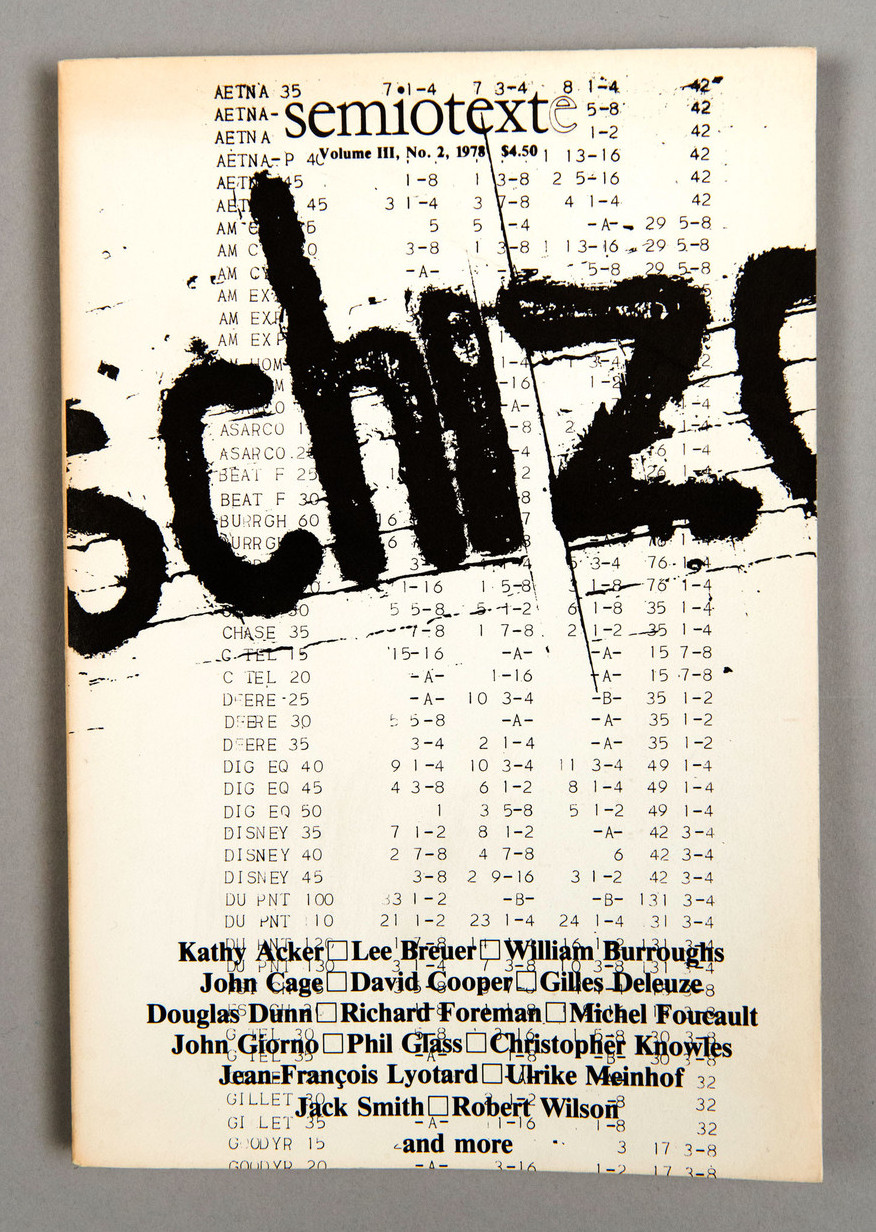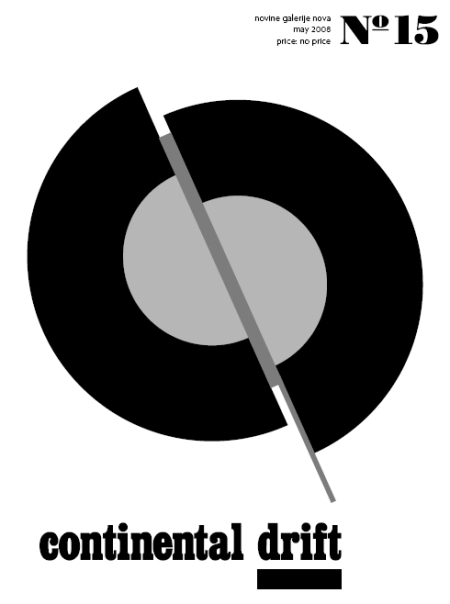Semiotext(e), 3(2): Schizo-Culture (1978)
Filed under journal | Tags: · anti-psychiatry, capitalism, linguistics, literature, philosophy, politics, power, psychoanalysis, schizoanalysis, schizophrenia, semiotics

“Semiotext(e) began in 1974 as a journal started by French philosopher Sylvère Lotringer in an effort to bridge radical French theory and the intellectual and art worlds of New York City. The original editorial board included ten people, mostly graduate students at Columbia University where Lotringer teaches, who chipped in fifty dollars apiece to get the journal started. They held their first conference in 1975: the Schizo-Culture conference on prisons and madness. Speakers included Gilles Deleuze, Félix Guattari, Michel Foucault, and Jean-François Lyotard, now all staples of the Semiotext(e) backlist.” (from Wikipedia)
With contributions by Kathy Acker, Lee Breuer, William Burroughs, John Cage, David Cooper, Gilles Deleuze, Douglas Dunn, Richard Foreman, Michel Foucault, John Giorno, Phil Glass, Christopher Knowles, Jean-Francois Lyotard, Ulrike Meinhof, Jack Smith, Robert Wilson, and others.
Edited by Sylvère Lotringer
Publisher Semiotext(e), New York, 1978
ISSN 00939579
221 pages
PDF (8 MB, updated on 2013-12-8)
See also Semiotext(e), 3(1): Nietzsche’s Return (1978).
Comments (2)Continental Drift Zagreb (2008)
Filed under newspaper | Tags: · activism, art, autonomy, capitalism, cartography, creative industries, economy, geopolitics, neoliberalism, politics, power, war

“It’s always useful to turn dreams into realities, because you get to measure the differences and even let yourselves be guided by the intrinsic gaps between the two. Continental Drift was the dream of a geopolitical analysis carried out by a diverse group (theorists, artists, activists) and mapped onto everyday social and political life as an expanding set of explanations and expressive potentials. The dream was made in USA, and even on Wall Street in New York City, but it was realized by a group of immigrants, returning exiles and general misfits, all marked by the basic heresy of left positions in an age of liberal capitalist empire. By transplanting this inquiry to Zagreb, Croatia – the home of the What, How & For Whom? collective – it seems we are bringing a new dream into focus. The desire is that of widening the intrepretative circle, crossing divides of language and historical experience, trying to build capacities of understanding and confrontation between the immigrants, exiles and misfits of the big continental blocs and especially their edges – the cracks that open up wherever anyone can no longer stand what is taken and imposed as the norm. Empire as we see it is always falling apart, for better and usually for worse, under the pressure of massive processes which we are unlikely to even see coming, let alone grasp or have the agency to change in any way. Yet as the urgency and also the absurdity of the present predicament begins to rise in intensity, at least all around there are people trying similar experiments.” (Brian Holmes)
Novine Galerije Nova, No 15, May 2008
Publishers: What, How and for Whom/WHW, Zagreb; AGM, Zagreb
Editors: Continental Drift Zagreb team (Ayreen Anastas, Rene Gabri, Brian Holmes, Claire Pentecost, What, How and for Whom/WHW, Ivet Ćurlin, Ana Dević, Nataša Ilić, Sabina Sabolović)
Design: Dejan Kršić
36 pages
Ralph Heidenreich, Stefan Heidenreich: Mehr Geld (2008) [German]
Filed under book | Tags: · economics, money, politics, power

Geld zu vermehren ist zum allgemeinen Gesetz des Handelns geworden. Das betrifft genuin das Feld der Ökonomie, aber kaum weniger das des Politischen.
Das Monetäre nimmt dabei vielerlei Form an. Selten ist es noch Münze, meistens dagegen Zahl, Rechenoperation in Kapitalströmen und verkaufter, vielfach beliehener Kredit. Güter, Rohstoffe und Daten werden ebenso umgewertet wie die Begriffe von Arbeit und Eigentum.
Die ökonomischen Verhältnisse sind mit denen der Politik eng verschränkt. Orte der Macht und Punkte von Entscheidungen liegen auf den Wegen der globalen Geldströme. Die Lage der Gegenwart ist von Asymmetrien der Macht gekennzeichnet, nicht zuletzt im Verhältnis von ökonomischem und militärischem Einfluss. Souverän ist, wer Geld macht. Die Untersuchung geht vom Begriff und der Geschichte des Geldes aus, um den Zustand von Ökonomie und Politik am Beginn des 21. Jahrhunderts zu betrachten.
Publisher Merve, Berlin, 2008
Volume 283 of Internationaler Merve Diskurs
ISBN 3883962171, 9783883962177
152 pages
PDF, PDF (updated on 2014-12-22)
Comment (0)
